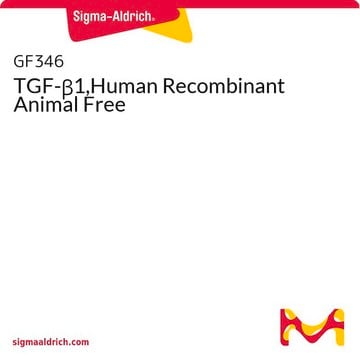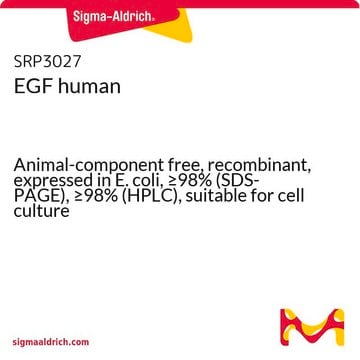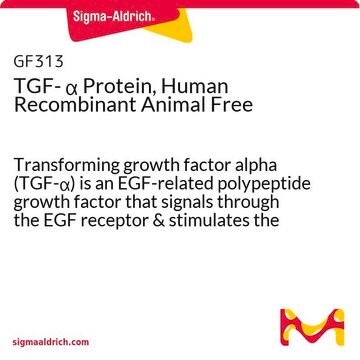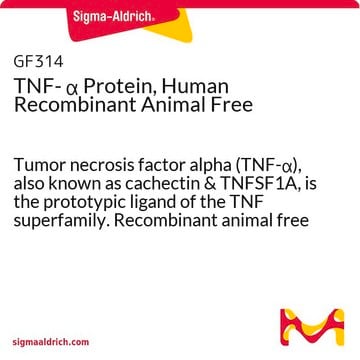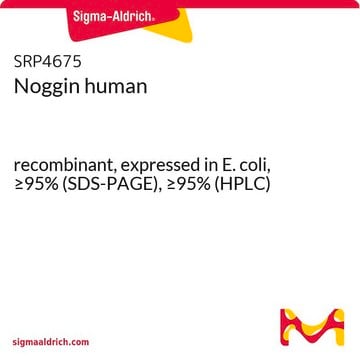H8541
Transforming Growth Factor-β1 human
TGF-β1, Xeno-free, recombinant, expressed in HEK 293 cells, suitable for cell culture
Synonym(e):
TGF-β1
About This Item
Empfohlene Produkte
Biologische Quelle
human
Qualitätsniveau
Rekombinant
expressed in HEK 293 cells
Assay
≥95% (SDS-PAGE)
Form
lyophilized powder
Wirksamkeit
≤0.5 ng/mL EC50
Qualität
endotoxin tested
Mol-Gew.
dimer 25 kDa (non-glycosylated)
Verpackung
pkg of 5 μg
Lagerbedingungen
avoid repeated freeze/thaw cycles
Methode(n)
cell culture | mammalian: suitable
Verunreinigungen
≤1 EU/μg
UniProt-Hinterlegungsnummer
Lagertemp.
-10 to -25°C
Angaben zum Gen
human ... TGFB1(7040)
Suchen Sie nach ähnlichen Produkten? Aufrufen Leitfaden zum Produktvergleich
Allgemeine Beschreibung
Anwendung
- to study the expression of PDGFRB (Platelet derived growth factor receptor β) in association with transforming growth factor-β signaling.
- to stimulate lung fibrosis in human fetal lung fibroblast cell line in order to further measure the in-plane elasticity of live cell layers using a pressure sensor embedded microfluidic device.
- to study the effect of TGF-β on HTRA1 (high-temperature requirement A1)-affected Wnt target genes.
Biochem./physiol. Wirkung
Physikalische Form
Hinweis zur Analyse
Signalwort
Danger
H-Sätze
Gefahreneinstufungen
Eye Dam. 1 - Skin Corr. 1B
Lagerklassenschlüssel
8A - Combustible corrosive hazardous materials
WGK
WGK 2
Flammpunkt (°F)
Not applicable
Flammpunkt (°C)
Not applicable
Analysenzertifikate (COA)
Suchen Sie nach Analysenzertifikate (COA), indem Sie die Lot-/Chargennummer des Produkts eingeben. Lot- und Chargennummern sind auf dem Produktetikett hinter den Wörtern ‘Lot’ oder ‘Batch’ (Lot oder Charge) zu finden.
Besitzen Sie dieses Produkt bereits?
In der Dokumentenbibliothek finden Sie die Dokumentation zu den Produkten, die Sie kürzlich erworben haben.
Kunden haben sich ebenfalls angesehen
Artikel
Discover answers to your frequently asked questions about animal component-free, xenobiotic-free, and chemically defined media and reagents for cell culture.
Verwandter Inhalt
Discover cancer research resources with modeling and profiling tools for cell culture, genomics, biomarkers, and more to help maximize your cancer research.
Unser Team von Wissenschaftlern verfügt über Erfahrung in allen Forschungsbereichen einschließlich Life Science, Materialwissenschaften, chemischer Synthese, Chromatographie, Analytik und vielen mehr..
Setzen Sie sich mit dem technischen Dienst in Verbindung.
